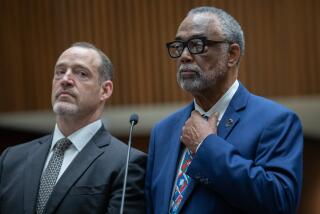Drawing Interest : Bradley Inquiries Thrust Low-Profile City Treasurer Into the Spotlight
Los Angeles Treasurer Leonard Rittenberg settled into a witness chair in the City Council chambers last month for what was to be a historic hearing into the city’s investigation of Mayor Tom Bradley for possible conflicts of interest.
As Rittenberg made himself comfortable next to City Atty. James K. Hahn, City Council President John Ferraro leaned to an aide.
“Who’s that guy next to Hahn?” Ferraro whispered.
It may have been the last day that any member of the City Council would have trouble recognizing Rittenberg.
Figure in Bradley Queries
The city treasurer has emerged as a central figure in the investigations into the mayor’s relationship with Far East National Bank, which paid Bradley to act as its adviser at the same time it was receiving city deposits.
And Rittenberg’s office, which has responsibility for all $2 billion of the city’s idle cash, has become the focus of concern for the City Council.
On Wednesday, Councilwoman Gloria Molina asked the council to order a management audit of Rittenberg’s policies. While her effort lost on a vote, Councilman Zev Yaroslavsky said his Finance and Revenue Committee will report to the council as early as July on the treasurer’s investment policies.
One of the actions prompting the ongoing Bradley probe was a telephone call made by the mayor to Rittenberg in March, in which Bradley inquired about city deposits at Far East. After the call, Rittenberg had his aides deposit $2 million in city funds at the bank. The treasurer said later that Bradley had not pressured him to deposit the money.
In another instance that has drawn the council’s attention, Rittenberg’s staff allowed $1.2 million to sit in an account at Far East National Bank, earning no interest, for several months. Rittenberg took the blame for the error.
But city officials who have dealt with the 21-year veteran of the city treasurer’s office say that such mistakes are not characteristic of his career. According to them, Rittenberg is a strong manager adept at computer technologies and the rapidly changing financial markets with which his office must deal.
Reputation as Activist
And, in an otherwise staid and colorless office, he has earned a reputation as an activist.
Rittenberg’s low profile among the council members was credited to his performance over the years.
“I think the treasurer’s office has been a relatively invisible office,” said Yaroslavsky, who as chairman of the Finance and Revenue Committee knows Rittenberg better than most on the council.
“Invisible primarily because it has not gotten the city in any trouble. Around here, when you know somebody’s name, it’s not because they did an outstanding job. It’s because they screwed up.”
Rittenberg, 57, was appointed treasurer by Bradley and quickly confirmed by the council in 1987. He had joined the office in 1968 as an accountant after an eclectic academic career that included majors in chemical engineering, mathematics and business administration. He eventually earned a degree in accounting from UCLA, served in the military and graduated from the San Fernando College of Law.
He steadily rose in the treasurer’s office to become chief deputy in 1981, and when then-Treasurer Robert Odell became ill in 1986, Rittenberg was named acting treasurer. Odell died in 1987.
In selecting a successor for the $83,415-a-year job, Bradley picked the No. 1 finalist from a list of 12 drawn up by the city’s Personnel Department.
While Rittenberg was still acting treasurer, he and Yaroslavsky traveled to New York together on city business.
“He was a doer,” Yaroslavsky said. “He wanted to be more of an activist than Odell had been. . . . Rittenberg was more aggressive, more impatient, more wanting to get things done more quickly.”
It may have been a penchant for activism that has landed Rittenberg in hot water.
Minority-Owned Banks
At the heart of the City Council’s concern is a policy developed independently by Rittenberg that allows millions of dollars of city funds to be invested in minority-owned banks at rates that may not be the highest available. Rittenberg says the policy, which has been supported by the mayor’s office, is an extension of the city’s existing programs to encourage minority business.
Explaining himself in a May interview, Rittenberg said: “The city and myself as city treasurer have a responsibility and commitment to assist those banks that contribute to the community. By placing deposits with (minority) banks, I have an expectation that this money will increase the amount for new loans in the community. It has been my position to become extremely pro-active in this pursuit. . . . I have a social conscience, and I feel this must be done.”
Since that interview, Rittenberg has refused to speak with the press and his staff has been instructed not to give any interviews.
Under the city’s somewhat unusual structure, the treasurer receives funds from taxpayers and other sources and deposits or invests the monies. Only the city controller can disburse funds. When the controller needs money to pay the city’s bills, he asks the treasurer to release some of the funds.
Just three city workers, sitting at gray metal desks in the bowels of City Hall, handle the task of placing the city’s $2-billion cash flow. More than $1 billion comes and goes in the course of a month, and hundreds of deposits are received each day. Rittenberg, while not personally investing all of the city’s funds, oversees all the department’s work.
Treasurers for other cities have said Rittenberg’s minority-investment policies are unusual, and they may not comply with the City Charter, which calls on the treasurer to seek the highest rates possible. In recent annual audits, the city controller’s office has identified what it considered “weakness” in internal controls--many of which have since been strengthened--but otherwise gave the treasurer’s office a clean bill of health.
Return on Investments
Rittenberg typically places in the top half to one-third of California’s big city treasurers in his return on investment, according to some studies. And that has meant good money for the city.
Earlier this year, for example, when city officials prepared the annual budget, their revenue projections were several million dollars higher than those made by independent economists. The city’s figures were higher, it turned out, because Rittenberg had timed the markets correctly and had placed most of the city’s funds in long-term, high-yielding accounts just as interest rates peaked earlier this year.
According to city workers, Rittenberg is considered shy, serious and an approachable administrator. But the criticism and publicity of recent months have taken a toll, according to Yaroslavsky.
“I think he’s going through hell now,” Yaroslavsky said. “When you come to work for the city of Los Angeles as treasurer . . . you never expected to be reading about yourself on the front page of the newspaper.”
Yaroslavsky, while publicly saying he is “very concerned” about Rittenberg’s policies, said he has counseled the treasurer to “relax a little bit and focus on the future. What has happened has happened. . . . The sun will rise tomorrow, and he will still be the treasurer.”
Perhaps taking that advice, Rittenberg wrote a letter to key City Council members late last month.
“The highly publicized events of the past two months have resulted in considerable misconception and distortion of the city treasurer’s operations,” he wrote. “As department head, I am responsible for the errors made by my staff and, similarly, I am also responsible for the achievements made by my staff. During my three years as acting treasurer and treasurer, this office has generated nearly $30 million of additional revenue. . . .
“I am proud of the city treasury’s accomplishments.”
More to Read
Sign up for Essential California
The most important California stories and recommendations in your inbox every morning.
You may occasionally receive promotional content from the Los Angeles Times.










